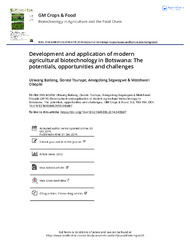| dc.contributor.author | Batlang, Utwang | |
| dc.contributor.author | Tsurupe, Gorata | |
| dc.contributor.author | Segwagwe, Amogelang | |
| dc.contributor.author | Obopile, Motshwari | |
| dc.date.accessioned | 2020-07-08T15:46:05Z | |
| dc.date.accessioned | 2021-03-15T09:19:18Z | |
| dc.date.available | 2020-07-08T15:46:05Z | |
| dc.date.available | 2021-03-15T09:19:18Z | |
| dc.date.issued | 2014 | |
| dc.identifier.citation | Batlang, U., Tsurupe, G., Segwagwe, A., & Obopile, M. (2014). Development and application of modern agricultural biotechnology in Botswana: The potentials, opportunities and challenges. GM crops & food, 5(3), 183-194. | en_US |
| dc.identifier.uri | https://www.tandfonline.com/doi/full/10.4161/21645698.2014.945887 | |
| dc.identifier.uri | http://moodle.buan.ac.bw:80/handle/123456789/250 | |
| dc.description.abstract | In Botswana, approximately 40% of the population live in rural areas and derive most of their livelihood from
agriculture by keeping livestock and practising arable farming. Due to the nature of their farming practises
livestock and crops are exposed to diseases and environmental stresses. These challenges offer opportunities for
application of biotechnology to develop adaptable materials to the country’s environment. On the other hand, the
perceived risk of genetically modified organisms (GMOs) has dimmed the promise of the technology for its
application in agriculture. This calls for a holistic approach to the application of biotechnology to address issues of
biosafety of GMOs. We have therefore assessed the potentials, challenges and opportunities to apply
biotechnology with specific emphasis on agriculture, taking cognisance of requirement for its research,
development and application in research and teaching institutions. In order to achieve this, resource availability,
infrastructure, human and laboratory requirements were analyzed. The analysis revealed that the country has the
capacity to carry out research in biotechnology in the development and production of genetically modified crops
for food and fodder crops. These will include gene discovery, genetic transformation and development of systems
to comply with the world regulatory framework on biosafety. In view of the challenges facing the country in
agriculture, first generation biotech crops could be released for production. Novel GM products for development
may include disease diagnosis kits, animal disease vaccines, and nutrient use efficiency, drought, and pest and
disease resistant food and fodder crops. | en_US |
| dc.language.iso | en | en_US |
| dc.publisher | GM Crops & Food | en_US |
| dc.relation.ispartofseries | GM Crops & Food;Vol. 5 Issue 3 | |
| dc.subject | Agriculture | en_US |
| dc.subject | Biosafety | en_US |
| dc.subject | Genetic engineering | en_US |
| dc.subject | GMO | en_US |
| dc.subject | Human resources | en_US |
| dc.subject | Infrastructure | en_US |
| dc.title | Development and application of modern agricultural biotechnology in Botswana: The potentials, opportunities and challenges | en_US |
| dc.type | Article | en_US |

